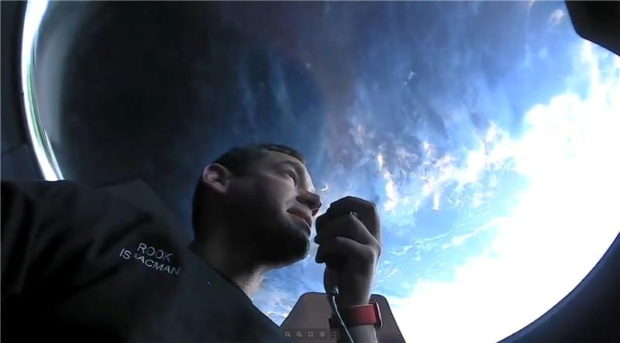
Inspiration4 crew member Jared Isaacman seen on their first day in space in this handout photo released on September 17, 2021. SpaceX/Handout via REUTERS
The quartet of citizen astronauts comprising the SpaceX Inspiration4 mission began their descent from space en route to a splashdown in the Atlantic on Saturday to complete a three-day flight of the first all-civilian crew ever launched into Earth orbit.
In preparation for their return to Earth, the SpaceX Crew Dragon vehicle conducted two rocket thruster “burns” on Friday to lower its altitude and line up the capsule’s trajectory with the targeted landing zone.
Early on Saturday, the crew donned their helmeted flight suits and made final cabin preparations as the spacecraft continued its autonomous sequence of return maneuvers, including separation from the vehicle’s lower auxiliary trunk to expose the capsule’s heat shield.
Following a final 15-minute ignition of its forward thrusters for a “de-orbit burn,” the capsule was expected to re-enter the atmosphere for its plunge to the ocean below, during which crew communications will be lost for about seven minutes.
The Dragon capsule, dubbed Resilience, is scheduled to parachute into the sea around 7 p.m. Eastern time, shortly before sunset, according to SpaceX, the private rocketry company founded by Tesla Inc electric automaker CEO Elon Musk.
Recovery vessels will then be dispatched to the splashdown site to retrieve the crew and Dragon capsule.
SpaceX supplied the spacecraft, launched it from Florida and flew it from the company’s suburban Los Angeles headquarters. The company presented live coverage of the return flight activities by webcast on its YouTube channel.
A brief camera shot from the cabin showed all four crew members strapped into their seats side by side.
The Inspiration4 team blasted off on Wednesday from the Kennedy Space Center in Cape Canaveral atop one of SpaceX’s two-stage reusable Falcon 9 rockets.
Within three hours the crew capsule had reached a cruising orbital altitude of just over 363 miles (585 km) – higher than the International Space Station or Hubble Space Telescope, and the farthest any human has flown from Earth since NASA’s Apollo moon program ended in 1972.
It also marked the debut flight of Musk’s new space tourism business and a leap ahead of competitors likewise offering rides on rocket ships to well-heeled customers willing to pay a small fortune to experience the exhilaration of spaceflight and earn amateur astronaut wings.
The Inspiration4 team was led by its wealthy benefactor, Jared Isaacman, chief executive of the e-commerce firm Shift4 Payments Inc, who assumed the role of mission “commander.”
He had paid an undisclosed but reportedly enormous sum – put by Time magazine at roughly $200 million – to fellow billionaire Musk for all four seats aboard the Crew Dragon.
Isaacman was joined by three less affluent crewmates he had selected – geoscientist and former NASA astronaut candidate Sian Proctor, 51, physician’s assistant and childhood bone cancer survivor Hayley Arceneaux, 29, and aerospace data engineer and Air Force veteran Chris Sembroski, 42.
Inspiration4 crew Jared Isaacman, Sian Proctor, Hayley Arceneaux, and Chris Sembroski, seen on their first day in space in this handout photo released on September 17, 2021. SpaceX/Handout via REUTERS
Isaacman conceived of the flight primarily to raise awareness and donations for one of his favorite causes, St. Jude Children’s Research Hospital, a leading pediatric cancer center in Memphis, Tennessee, where Arceneaux was a patient and now works.
The Inspiration4 crew had no part to play in flying the spacecraft, which was operated by ground-based flight teams and onboard guidance systems, even though Isaacman and Proctor are both licensed pilots.
SpaceX already ranked as the most well-established player in the burgeoning constellation of commercial rocket ventures, having launched numerous cargo payloads and astronauts to the space station for NASA.
Two rival operators, Virgin Galactic Holdings Inc and Blue Origin, inaugurated their own astro-tourism services in recent months, with their respective founding executives, billionaires Richard Branson and Amazon.com founder Jeff Bezos, each going along for the ride.
Those suborbital flights, lasting a matter of minutes, were short hops compared with Inspiration4’s three days in orbit.